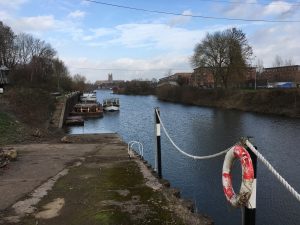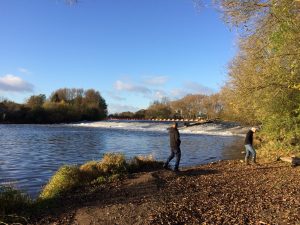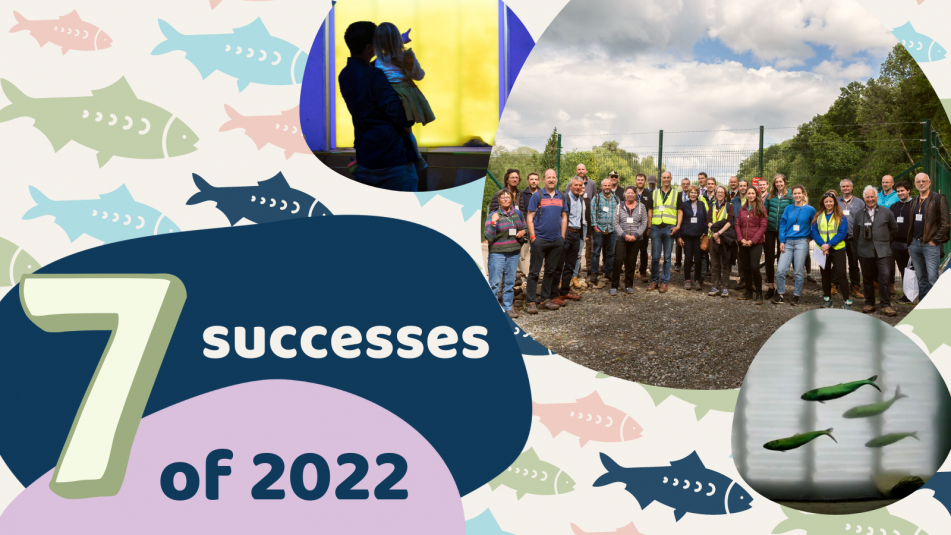
2022 has been a big year. Work was completed on the fish passes and we celebrated the first shad run in an unlocked river. At Diglis fish pass, thousands of visitors wondered at the wildlife under the surface of the Severn; and our volunteering community grew even stronger.
Although we are celebrating the project’s completion this year, its legacy continues into 2023. Tours of Diglis Island and fish pass will be back in March 2023, and volunteering and scientific monitoring will once again be an important part of spring activities.
But before we wrap up for the year, let’s have a look at all that has been achieved in 2022. Join us as we take a look at Unlocking the Severn’s Top 7 highlights of 2022:
1. Unlocking the Severn unlocked 158 miles of river for endangered and rare migratory fish this year.
Back in January, we let the water into Holt fish pass, and by April all construction work was complete. The completion of Holt fish pass meant that Unlocking the Severn reconnected 158 miles of river for fish this year, providing an alternative route for fish around four major navigation weirs on the River Severn and two smaller weirs on the River Teme.
Excitingly, our completed fish passes provided access for the endangered twaite shad to their historic spawning grounds, for the first time in nearly 180 years! Finally, shad have easy passage to a key section of spawning habitat once more.
Barriers in river systems pose huge problems for fish, fragmenting habitats and creating obstacles between them and their preferred spawning grounds. A reconnected River Severn now means that fish can navigate much more freely through the river, especially benefitting migratory fish, such as shad, salmon, eel and lamprey, who rely on epic journeys between seawater and freshwater for their lifecycles. This in turn has a positive effect on the wider ecosystem, boosting fish populations and providing food for the mammals and birds we see along our riverbanks.
There she flows! Holt fish pass now open to the river (video taken February 2022).
2. Shad have navigated all our fish passes and reclaimed historic spawning habitat, for the first time in nearly 180 years!
In June this year, initial scientific monitoring results showed promising signs of a successful shad run. Acoustic tagging studies, conducted in collaboration with Bournemouth University, University of Hull and Environment Agency, tracked shad past Diglis, Bevere and Holt fish passes. We also received audio evidence of shad spawning in the vicinity of all our fish passes.
But it was the eDNA results, confirmed this autumn, that were the real icing on the cake. Water samples collected in Stourport contained shad DNA, proving that these fish had made it beyond our fourth and final fish pass this year.

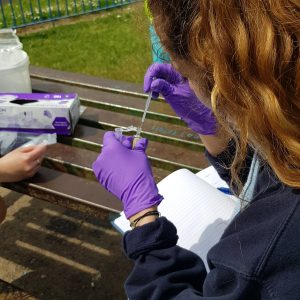
Left: twaite shad caught at Upper Lode Weir, to be carefully fitted with an acoustic tag. Photo by Environment Agency. Right: a water sample is prepared for eDNA analysis. Photo by Paul Kilgallon.
The big news attracted lots of media attention. Our story featured in articles by BBC News and The Guardian; BBC Midlands Today came to film at the fish pass; and members of the Unlocking the Severn team chatted on BBC Hereford and Worcester radio station.
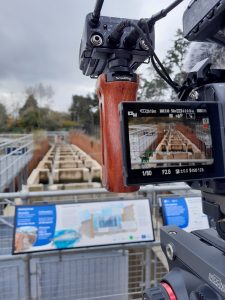
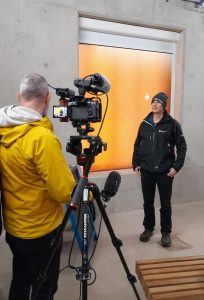
You can read the full press release on our website here.
3. We welcomed our 7,000th visitor to Diglis Island and Diglis fish pass this autumn.
It’s safe to say we went all out with our events and activities programme this year! From March until mid-November, we offered visitors lots of opportunities to explore Diglis Island and the fish pass.
Through a mixture of tours, drop-in events, and special activities such as open days, exhibitions and storytime sessions in the fish pass, visitors were able to visit two new exciting visitor spaces in Worcester and learn more about how the project is helping migratory fish. We were thrilled to have welcomed 7,018 visitors to Diglis Island and fish pass by the end of the visitor season.
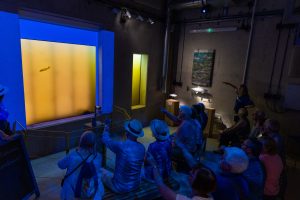

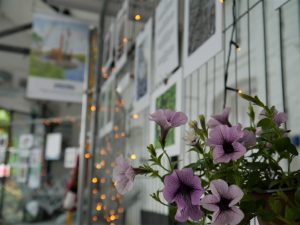
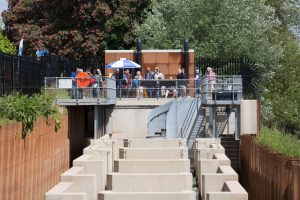
Our tours and events programme would not have been possible without the help of the brilliant volunteer Diglis Island Guides (DIGs), who lead the tours and provided great support during events and open days. We are always looking for more DIGs, so if you are interested in volunteering for our project, head to our volunteering webpage to register your interest or ask for further information.
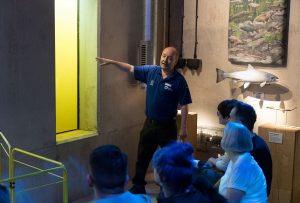
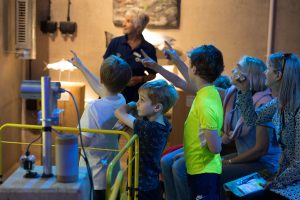
We’d also like to say a big thank you to the Green Team, our volunteering group based on Diglis Island, for the work they have done this year to make Diglis Island a beautiful space for wildlife and visitors.
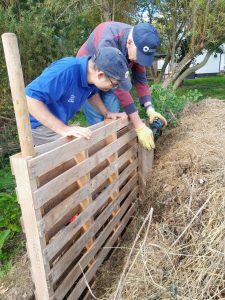
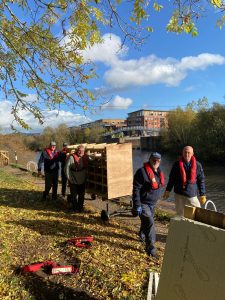
We are looking forward to kicking off next year’s tour season in March 2023, in time for the spring fish migration. Further information, including booking dates, will be available next year. Keep an eye on our tours webpage, our social media (@SevernUnlocked) or sign up to our newsletter (in the footer of this webpage) for updates.
4. 25 species of fish were recorded using Diglis fish pass this year
We were excited to see yet more species of fish using Diglis fish pass this year, benefitting from easier passage through the river. Back in May, a grayling was the 24th species of fish to swim past Diglis Fish Window. Then in the summer, during a drain-down of Diglis fish pass to clean the viewing window, we spotted a stone loach swimming in the shallow pools! The exciting discovery of a stone loach in the fish pass took the total up to 25.
We also saw an increase in the number of shad using the fish pass, compared to last year. In 2022, we had a total of 757 shad through Diglis fish pass during the April-June migration period. This brings the total shad count though Diglis to 1380 over two years.
5. Our first year of school visits was a success!
With the support of the brilliant Canal & River Trust Explorer volunteers, we completed our first year of school visits to Diglis. We began with pilot visits in September 2021, and soon gathered lots of interest from local schools. We were thrilled to welcome 623 students and teachers to Diglis in our first academic year, across a range of age groups.
Our visits to Diglis Island and Diglis fish pass cover a range of topics, such as rivers, habitats, STEM, and local history, with a strong link to school curriculums. Our second year of visits has already begun, we have had 8 school visits this autumn term and look forward to welcoming more school groups to Diglis in the spring.
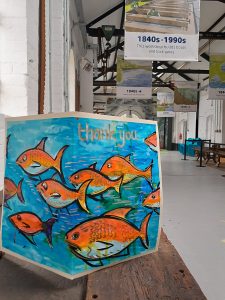
A thank you card for our Explorer Volunteers. Handmade by students and staff from Bablake Preparatory School.
6. Over 100 delegates from 9 different countries attended our Shad Symposium in Worcester.
Shad scientists, assemble! Towards the end of May this year, Unlocking the Severn hosted a scientific conference in Worcester. Over 100 experts gathered at Worcestershire County Cricket Club to share knowledge of the shad, fish passes and river restoration projects around Europe.
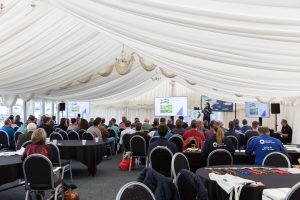
20 different speakers discussed topics such as twaite shad spawning migrations in UK, Belgium, Lower North Sea, and the Baltic; understanding the distribution of shad using eDNA; and the shift in shad range in response to climate change (to name just a few).
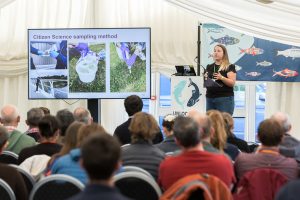

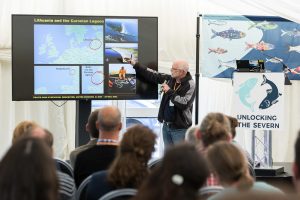
We also organised site visits to Diglis, Bevere and Holt fish passes to share the incredible feat of engineering that went into building the new fish passes. At Diglis, delegates had the chance to spot fish through our underwater viewing window and learn about the importance of community engagement to Unlocking the Severn.
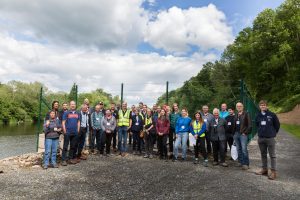
The strengthened connections made at the Symposium will mean that we continue to share the results of our scientific monitoring with other teams around the world. From increased communication, knowledge will be shared to develop more successful projects to better protect migratory fish.
You can find out more on our Shad Symposium webpage, including the full conference programme.
7. We celebrated the release of our project documentary
Over 100 people joined us on Zoom in February to celebrate the release of our long-awaited project documentary. Produced by award-winning filmmaker Nina Constable and presented by Monty Halls, our 15-minute film tells the story of the shad, and captures the goals and successes of our project up to the completion of Diglis fish pass.
The film has been watched over 5,000 times on YouTube so far. If you haven’t seen it already, grab your popcorn and click on the video below!

